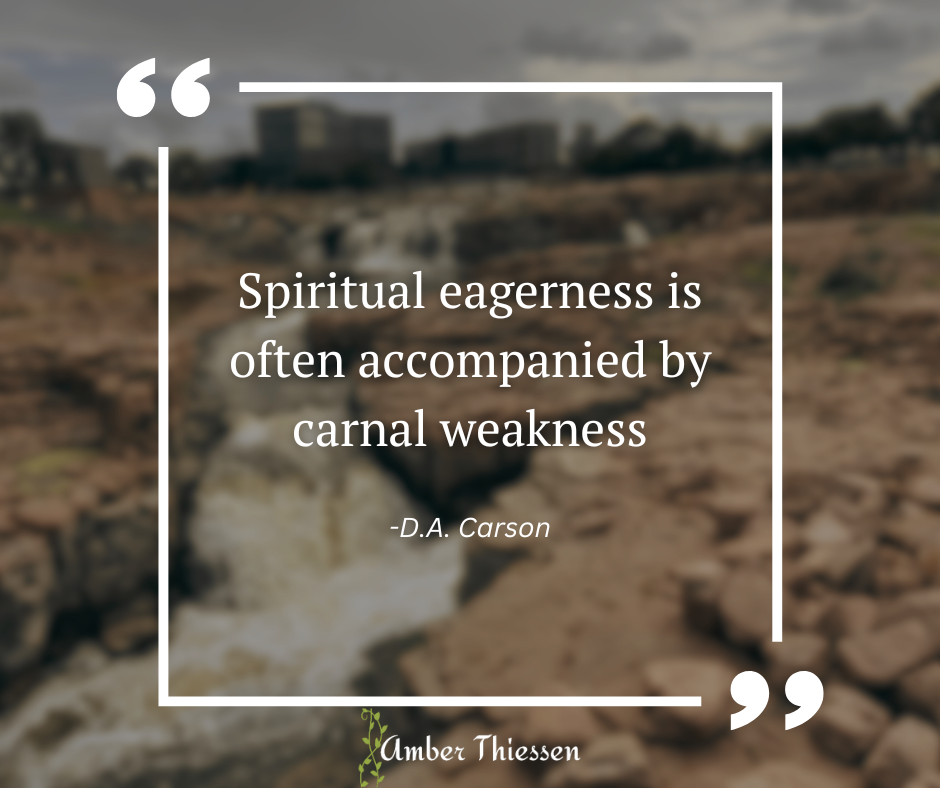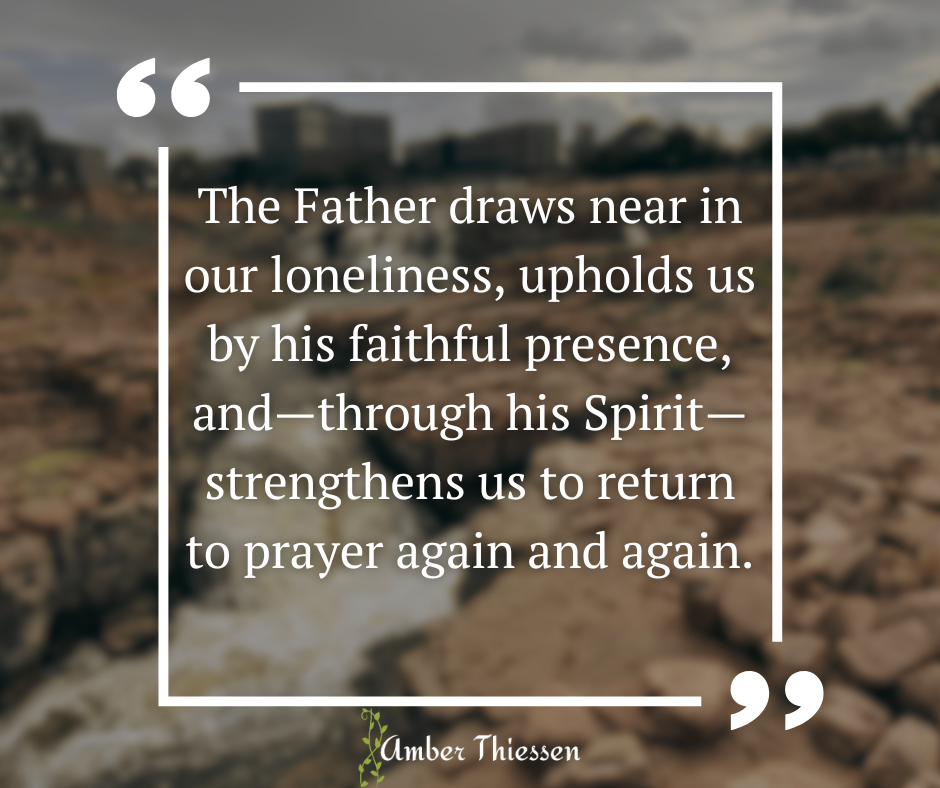Committed Prayer: Learning to Pray with Jesus in Gethsemane
- Amber Thiessen

- Sep 8, 2025
- 7 min read

We’ve attended a couple of weddings this summer, watching joy-filled couples vow to love and cherish one another. It takes me back to our own wedding day twenty years ago—the bubbling joy, easy laughter, and eager excitement of beginning life together.
Two decades later, that love is deeper. It's been shaped by perseverance and humility, refined through the tempests of life’s joys and trials.
In the same way, our relationship with God—and especially our prayer life—often begins with desire and devotion. But it matures and deepens only through consistent, sometimes difficult commitment.
Bethany Broderick says it like this, “Just like marriage takes work and structure, so does our prayer life. Seeing prayer as a discipline doesn’t suck the life out of our relationship with God. Rather, intentional structure enhances our prayer life.”
In Matthew 26, Jesus gives us a picture of what that kind of prayer looks like. As He enters the garden of Gethsemane, we see the culmination of what we’ve been exploring together:
We began with intentionality, choosing to enter God’s presence with purpose.
We explored partnership, joining with others to watch and pray.
We leaned into honesty, bringing our raw, tangled emotions to the Lord.
And we embraced submission, surrendering our desires to His perfect will.
And now, as the night grows darker, Jesus shows us what it means to stay committed in prayer—even when others fail, when weariness presses in, and when obedience comes at great cost.
Arriving at the garden, Jesus longs to pray. Desperately relying on this communion with the Father, He carries the crushing weight of what’s about to unfold. The air is thick with dread, heavy with sorrow. His friends walk beside Him, seemingly unaware of the magnitude of this moment.
“Sit here, while I go over there and pray.”(Matthew 26:36)
Taking Peter, James, and John a little further, Jesus shares the depth of His anguish:
“My soul is very sorrowful, even to death; remain here, and watch with me.”(Matthew 26:38)
Then, leaving them, He turns to pray—His heart bending toward surrender, His lips pouring out the most earnest prayer of His life.

Eagerness-Desire to Pray
Before they arrive at the olive grove, Jesus shared the Passover meal with His disciples. Then, along the way, He spoke words that must have stunned them: “You will all fall away because of me this night.”(Matthew 26:31)
Peter was quick to protest, and the others joined him, boldly declaring their unwavering loyalty—even to death (v. 35).
Their hearts were sincere. Their zeal was real. They meant every word.
Our prayer lives often begin the same way—with deep desire and earnest commitment. Maybe it was at a women’s retreat, during a season of spiritual renewal, or when you first grasped the beauty of the gospel. In those moments, you longed to commune with God, to pour out your heart before Him.
This eagerness is a gift of grace. As A.W. Tozer reminds us, “We pursue God because, and only because, He has first put an urge within us that spurs us to the pursuit.” [1]
But while initial desire is essential, it isn’t enough on its own. Like a newlywed couple whose love deepens through perseverance, our commitment to prayer must also grow beyond its first spark of passion.
At the start, we may thirst like newborns for the sweetness of God’s presence, soaking up every moment in prayer. But as we mature, that eagerness leads to a steady pursuit of deeper knowledge of God—learning His will and walking in obedience.
When you consider your current prayer life, do you feel eager to meet with God? Ask Him to renew your delight in His presence and to deepen your desire for Him.

Human Fickleness-Struggling to Stay Awake
We know what happens next.
"And he came to the disciples and found them sleeping. And he said to Peter, 'So, could you not watch with me one hour?'" (Matt. 26:40)
"And again he came and found them sleeping, for their eyes were heavy." (Matt. 26:43)
Jesus had just warned them that they would fall away (v.31). That should have stirred them to urgent, desperate prayer! Yet there they were… asleep.
It had been a long day, and it was late. It’s understandable they were tired, right? But Jesus’ suffering was real, His anguish evident—and they missed it. Even though Jesus spoke directly to Peter, His words were for all of them. The very ones who had promised unwavering faithfulness couldn’t stay awake to pray with Him in His darkest hour.
D.A. Carson points out, “Spiritual eagerness is often accompanied by carnal weakness—a danger amply experienced by successive generations of Christians.”[2] In other words, we often have a genuine desire to do what is right, yet we lack the strength to follow through (Rom. 7:18-20). This is what it means to be fickle—easily swayed, prone to change, unsteady in our commitments.
And if we’re honest, fickle describes us well.
We know this tension. Seasons of busyness, emotional exhaustion, or even ministry itself can leave us distracted and prayerless. We want to pray, but we fall asleep—sometimes literally, often figuratively. Jesus names this reality with compassion: “The spirit indeed is willing, but the flesh is weak” (Matt. 26:41).
Here’s the good news: we are fully known by God. He sees how our sinful nature and the quiet drift of apathy pull us away from Him. And this is exactly why He saved us—not so we’d simply keep functioning in sin, but so we could experience true redemption and daily reconciliation with Him. That’s the heart of repentance.
Our weakness in prayer doesn’t surprise Him. It’s why He calls us to depend on Him rather than ourselves. Peter and the other disciples had promised to be faithful to the end… yet they fell asleep. They needed to pray for themselves because danger was right around the corner.
They failed—but their Lord did not.
When we are weak, He is strong.
When we are faithless, He is faithful.
Prayer isn’t about gritting our teeth and trying harder. It’s about humbly acknowledging our weakness and leaning fully on God’s strength.
When you think about your own prayer life, where do you see both eagerness and weakness at play? How can you lean on God’s strength instead of relying on your own?

Christ’s Response-Persevering When Others Fail You
Jesus went back to pray—three times.
Three times he catches them asleep, oblivious to his suffering.
How do we respond when others let us down?
If we enter—even a little—into the anguish of Jesus’s sorrow, we can easily recall our own heavy moments: reaching out for counsel or prayer, only to be met with silence, a half-hearted response, or simply forgotten altogether. The loneliness of our calling settles in. Frustration builds. If we’re honest, the lure of self-pity calls to us from around the corner.
But not Jesus.
While his friends slept, he persisted. As their eyelids grew heavy, his prayers grew more fervent.
He didn’t abandon prayer because they had abandoned him. He entrusted himself to the Father. This is our model for commitment in prayer: we don’t pray because others show up for us; we pray because God meets us there.
Eugene Peterson writes, “We survive in the way of faith not because we have
extraordinary stamina but because God is righteous, because God sticks with us.”[3] In our Gethsemane hours, this means we are not left to grit our teeth alone. The Father draws near in our loneliness, upholds us by his faithful presence, and—through his Spirit—strengthens us to return to prayer again and again. God’s sticking with us is the very reason we can keep sticking with him.
Like Jesus, we can keep returning to prayer—even when we feel alone, misunderstood, or disappointed.
When others let you down, how does that affect your prayer life? How might God be inviting you to turn to Him instead of withdrawing?

Conclusion-A Commitment Shaped by Grace
Commitment to prayer changes us. Over time, as Thembelani Maqajana reminds us, "Our devotion to God through prayer produces good results; it:
1. Develops a richer relationship with God
2. Provides understanding of God’s character, as we experience communion with the God who is love (1 John 4:8)
3. Strengthens us to avoid temptation (Matt. 26:41)."
These are the quiet, steady fruits of a life devoted to seeking Him. They don’t come instantly, but as we keep showing up in prayer, God uses our faithfulness to shape our hearts and lives.
]
The essence of commitment, dedication, and devotion to prayer is this: a grace-shaped posture of ongoing, humble dependence. Over time it forms our days and our desires, deepens our communion with God and our love for others, and steadies us with consistency—especially when it’s hard or inconvenient.
When we’re eager, may God give us courage to persevere.
When we’re fickle, may God give us humility to repent.
When we’re let down, may the Lord help us show grace.
Commitment to prayer isn’t about perfect performance. It’s about a heart that keeps turning to God—again and again—through eagerness, weakness, and even loneliness. Jesus’ time in Gethsemane shows us what this looks like: steadfast dependence on the Father who hears.
As I came across this prayer, it really stirred my heart, and I hope you'll pray it with me:
"O God, I have tasted thy goodness, and it has both satisfied me and made me thirsty for more. I am painfully conscious of my need of further grace. I am ashamed of my lack of desire. O God, the triune God, I want to want thee; I long to be filled with longing; I thirst to be made more thirsty still. Show me thy glory, I pray thee, that so I may know thee indeed. Begin in mercy a new work of love within me. Say to my soul, “Rise up, my love, my fair one, and come away.” Then give me grace to rise and follow thee up from this misty lowland where I have wandered so long. In Jesus’ name, Amen." [4]
[1] A. W. Tozer, The Pursuit of God (Camp Hill, PA: Christian Publications, 1982), 6.
[2] D. A. Carson, The Expositor’s Bible Commentary: Matthew, vol. 8, ed. Frank E. Gaebelein (Grand Rapids, MI: Zondervan, 1984), 544.
[3] Eugene H. Peterson, A Long Obedience in the Same Direction (Downers Grove, IL: InterVarsity Press, 2000), 150.
[4] A. W. Tozer, The Pursuit of God (Camp Hill, PA: Christian Publications, 1982), 11.




hi Amber, your posts have been so good for my soul. 💞 thank you for sharing them. - rebekah